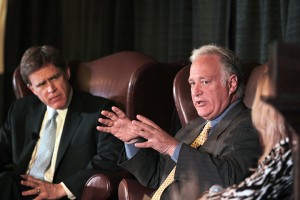
By Taylor Griffin
News Editor
Though the next Texas Legislative session isn’t due for another year, the issue of higher education value continues to buzz on campuses around the state. On Monday, the Baylor College Republicans and Baylor College Democrats hosted two rising state legislators in a forum to discuss on-campus topics ranging from financial aid to finding one’s passion.
“Whether it’s the amount of debt or whether we can carry concealed guns on campus, what sports teams we watch, it all directly affects students at Baylor,” said Scottsdale, Ariz., senior Michael Blair, president of Baylor College Republicans.
State Rep. Dan Branch, R-Dallas, and state Sen. Kirk Watson, D-Austin, facilitated the discussion in the Barfield Drawing Room and answered questions from the student body concerning the state of higher education in Texas.
Watson said the current situation in Texas colleges is strong but capable of improving in areas such as affordability, maintenance of rigorous curricula and skills development.
“I think higher education in Texas is good, but there’s so much opportunity for growth,” said Watson, an 1980 Baylor grad himself.
Financial aid and the cost of a college degree led the panel’s opening discussion. Both legislators mentioned the help students can receive through the Tuition Equalization Grant, which provides aid to Texas students with financial need attending
private, nonprofit colleges.
Because the grants go to Texas students, Watson said, it adds to the efficiency of the investment and becomes a better use of budget dollars.
It allows the state to retain its native students and supplement the higher cost of tuition found at private colleges and universities. Branch said it makes the grant one of the best values of education dollars in the state.
“I foresee that that program has an excellent track record of bringing value to the state of Texas, and I would imagine that it will continue on as the economy stays strong,” Branch said.
In 2011, Gov. Rick Perry challenged Texas schools to offer a more affordable yet substantial education with his “$10,000 degree” initiative, which would combat the high cost of tuition. While schools such as Texas A&M-Commerce and South Texas College have implemented his suggested system, Watson said the limitation on this seemingly ideal system is every school should not be on equal ground. Different colleges and universities serve various purposes, Watson said, and an equal cost of degrees would hinder the rigor of curriculum.
“I think that we need to explore how to make things more affordable,” Watson said. “We need to explore the opportunities for new technology, but we need to also recognize that one size probably shouldn’t fit all.”
Branch said he is optimistic about the prospects of lowering the price while boosting the quality of education with cost-efficient means with hybrid courses and online lectures.
“As technology becomes so invasive in our culture and becomes a larger part of education, we think there are opportunities for some decreased cost,” he said.
The biggest concern with the level of rigor in the state, Watson said, lies with the K-12 education system, specifically in math. The need for STEM, or science, technology, engineering and mathematics, majors has greatly increased, Watson said.
“From a job perspective, you see a lot of growth in that area, and you see a lot places that are growing in Texas that are focused on that,” he said.
However, while those majors and jobs are high demand, majors outside of these few are still hot commodities in the workforce. Both legislators emphasized the importance of honing one’s skills to fit the right position in the workforce.
“If we don’t successfully educate our next generation, then we will suffer,” Branch said. “I think it behooves us all to try and get on the same page.”
Additionally, both legislators advised future politicians and students alike to stay involved, engaged and informed in politics, agreeing that doing so makes for a more
knowledgeable public.
Schertz senior Kimani Mitchell, Baylor College Democrats president, said open discussions of higher education like this forum bring together relevant ideas to which all Baylor students can relate.
“Everyone can attest to the level of financial aid and cost of education,” Mitchell said. “Getting a Baylor degree is more than just a piece of paper.”
Blair said the purpose of the forum was to improve campus dialogue and generate academic discussion. He said he believes the issues presented at the forum reflect the thoughts and curiosities of students at Baylor because the issues directly relate to all of them.
“The best thing we can do as students is to stay interested because it affects us too,” he said.






